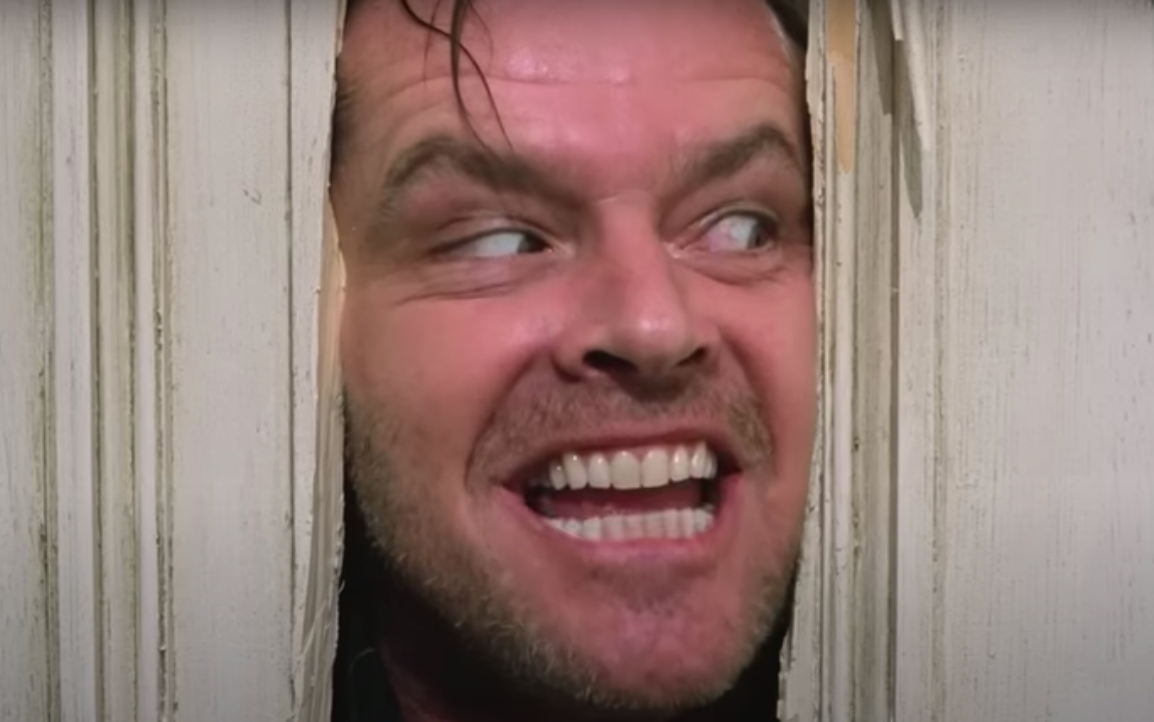essays
Five Times Terry Pratchett’s Novels Were There For Me

I was devastated to hear about the death of Terry Pratchett a few weeks ago. He had Alzheimer’s, yes, but I expected him to live long in spite of it. The best-selling author of several fantasy books, the bulk of which consisted of the Discworld series, a fantasy satire series that explored everything from Shakespearean elves to the birth of media. I first found his Discworld books during that important time between middle school and high school, so they’ve greatly influenced my very neural circuitry. The Discworld novels weren’t just playful, satirical fantasies: they were about idealism and justice and inner strength — important texts for me when I was trying to determine and articulate my own values.
I would say most of the Discworld novels switched on the lights in my head, but I made a list of five, in the order I read them. Each one shaped me politically and personally in ways that I could only see in hindsight. And they’ve stayed with me through the years, as I’ve reread for guidance or even just to return to Discworld.

1. Thief of Time
I moved to a new town in seventh grade. Sure, it was only 40 minutes away from my old town, but in New Jersey that felt like 40 light years.
In Thief of Time, there’s a character that is described thus:
Jeremy tried to be an interesting person. The trouble was that he was the kind of person who, having decided to be an interesting person, would first of all try to find a book called How To Be An Interesting Person and then see whether there were any courses available.
I had already felt like a stranger in a strange land in my hometown, and the only problem with this new town was that I hadn’t been here long enough to learn all their secret codes. Everyone operated on rules that felt false, even as they worked: wearing designer clothes, going to certain parties, following the right trends. I would try doing these things, not understanding their purpose but hoping for some of their benefits, and do them incorrectly anyway. My clothes would be too scruffy, I would feel ill paying so much for designer, and I couldn’t comprehend the reasoning for a party where you weren’t discussing your feelings and thoughts with your friends.
Thief of Time was the first book I read of the Discworld series, a wry, self-aware land where I felt right at home. Even though Thief of Time was about time traveling monks and witches and Death’s granddaughter and the apocalypse, it felt true. Truer than reality, in some ways: It was about the importance of learning and accepting who you really are, what humanity means, and saving the world, and that felt real to me.
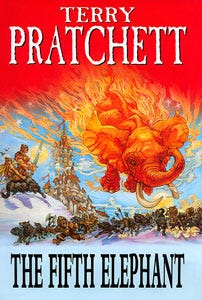
2. The Fifth Elephant
Is it odd to say that I still relate to Commander Sam Vimes of the city police department in Ankh-Morpork? But then, I’ve met other strong-valued women who also feel a common connection to Sam Vimes. I think it’s because he’s especially stubborn about his values, a common theme among my female friends. I read this at the end of eighth grade only a few months after the Invasion of Iraq, which to me felt like yet another war America was embroiling ourselves in, for reasons still unknown, despite the buzzwords I would see on TV and hear among the adults in my life.
Vimes was promoted nearly every book, but this book, with his turn as a diplomat, was particularly of importance to me. I should mention now that I have a Master’s in Public Diplomacy. (It’s not that odd — my program director loved the original Star Trek and would reference it in class all the time.) Anyone who’s read anything about diplomacy knows that international relations is full of people who understand the academic notions of diplomacy but not necessarily the etiquette of juggling different interests all at once. Vimes was very bad at being a traditional diplomat, which translated into meaning he was good at being an unconventional diplomat: a little too authentic to be completely tactful and a little too empathetic to be a total jingoist.
In a way, I learned everything about diplomacy from this book. Alright, it’s more like I learned some common ideas that run through diplomatic relations which were satirized in this book: there’s the doublespeak, the subtext, and the casual references to national sovereignty (I was also in Model United Nations in high school). The book came out in 2000, so it still used the pre-9/11 trope of veiled references to Western international relations to Eastern Europe and Russia, but it felt just as relevant no matter who were ascribing as our enemies.
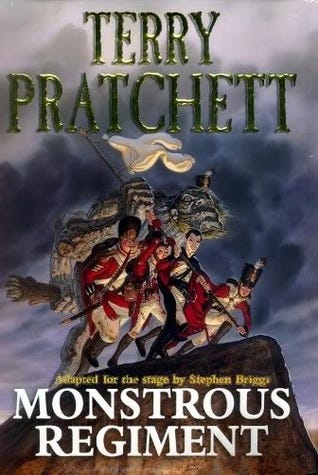
3. Monstrous Regiment
I was an angry young feminist when I was in middle school, vibrating with self-righteous energy. This was before it became more popular to be feminist, even before Dove co-opted the term for capitalist purposes.
I read this book right before entering high school. I’d already seen what middle school meant in terms of presenting yourself as a woman — the way you walk (with a sway) and talk (quieter than I could manage), and I knew I was extremely unprepared for high school. Probably mostly in the way that I couldn’t stop talking about feminism and equality.
In Monstrous Regiment, Polly Perks dresses up as a man to go into the army to find her brother. Before doing so, she even has a sequence where she mentally coaches herself to walk more like a man:
At least women swung only their hips. Young men swung everything, from the shoulders down. You have to try to occupy a lot of space, she thought. It makes you look bigger, like a tomcat fluffing his tail.
She is surprised to meet quite a few women in her situation. But they all have their particular reasons to join the army, and it’s not necessarily to fight the good fight. I’ve written about this trope before, but whenever a woman goes to war under a guise, she’s usually partly escaping a method of sexist oppression. Perks lives in a country with a religious bent to their wars — a god that makes ridiculous rules over colors and food and women. Vimes makes a reappearance as a diplomat, but Perks is particularly self-aware about her country’s situation and international image: she sees that her situation can be put in a compromising position if she is too eager for a larger power’s help. It’s a canny way of seeing the patronizing way one country can exert power and seem to aid another, not unlike the patronizing way certain women are treated like political figureheads rather than political figures in their own right.
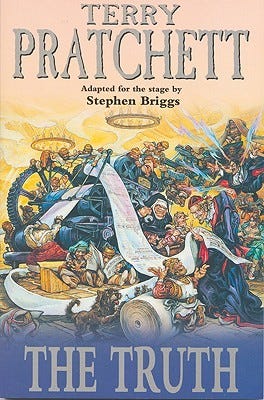
4. The Truth
It’s odd to put the Truth on the list because I find the main character so annoying as an adult. With his slightly tactless argumentative nature, William de Worde was a totally new perspective for me. He struggles with class relations and being, well, kind of a pompous jerk — which most characters point out to him. William may have come from a rich, privileged family (not unlike my new environment) but wants to get away from his overbearing, racist father and be a better person. He accidentally starts a newspaper with some dwarves, a vampire, and a romantic interest.
This I read in the beginning of high school, during the 2004 Kerry and Bush election. I joined the speech and debate team, which was perfect for someone with social anxiety, highly sensitivity and super shyness — no, wait. Just kidding. What I mean was, not only was I surrounded by proto-lawyers, I was trying to make sense of the debates storm on in the political arena as well. What was frustrating for me — and still is — because I felt that these arguments (both IRL and in the political arena) came from a sense of ego and bluster more than being truthful and authentic.
I liked how William forced himself to talk to new people, and worked to undo the patriarchal programming in his head, and also did I mention that everyone called him out on his jerkishness? I was young enough that I still found it natural to relate to characters who were deeply, openly flawed. I mean, I still relate to them now, but more egotistical and megalomaniacal women than problematic jerks. William de Worde was a whole new vantage point on characters I was used to relating to — like Vimes and Vetinari — and showed that they were fools in this scheme where they were meant to be fooled. The Truth spun a disturbing plot of the use of power, evoking political thrillers like The Manchurian Candidate or All the Presidents’ Men. Discworld novels treat implicit power structures with even more disgust than those movies do: according to Pratchett’s more idealistic plots, money and power can poison morality when used to uphold said money and power. Sure, it’s simplistic ideology, but the twist in this story is William de Worde’s purposeful pulling away from his aristocratic family: it meant he was willingly rejecting the power structures he knew he was himself complicit in.
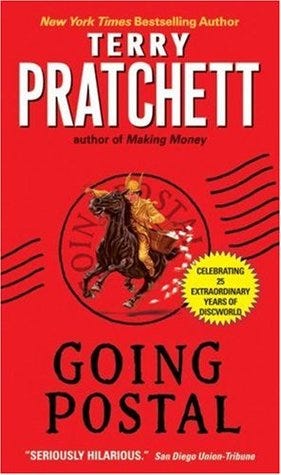
5. Going Postal
Going Postal is the weirdest book in the Discworld series — it’s about a con man named Moist von Lipwig who is tricked into becoming postmaster of the crumbling post office — but somehow it’s the one I hold closest to my heart. The writing is amazing as Pratchett goes deep into Moist’s psyche. Sure, Moist is a simple con man, but his interiority is highly relatable in that he can see how he looks from the outside and how it contrasted with his insides. He was very good at knowing how things would “look,” at the methodology to how you presented yourself that could convince others to trust you. There was something a little too smart about Moist, as if his criminal ways came from boredom more than loose morals.
I was finishing my first year of high school when I read Going Postal. By this time, I knew I would never learn the language of being cool, or calm, or sure. I would always be hungry with curiosity, slightly obsessive in my researching efforts, and reviewing and planning and exploring possibilities of what could be in my mind.
But while I knew who I wasn’t, there was such a large gap between who I wanted to be and who I was. Somehow, Going Postal articulated this gap for me in a way no young adult novel could. It wasn’t about being a certain way, it was about seeing the gap and not understanding how to manage it. While it was frustrating to know this at my young age, it seems especially helpful now. Because while there was a gap, I knew there was a gap. I knew that even if this was how it was now, this wasn’t going to be it for me.
Moist was different from past Discworld characters because he was primarily dishonest, but he still hewed to a certain value system. He, too, knew there was a gap — not in who he wanted to be, but in his value system and what he valued. He played with what other people valued in a big way in a way that made them trust him. They did so wholeheartedly that he felt obligated to make himself more trustworthy.






